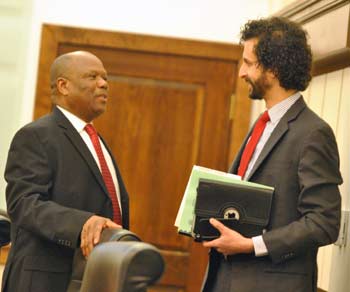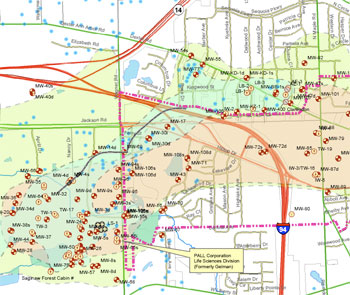Washtenaw County board of commissioners meeting (March 6, 2013): Following a brief public portion of their meeting, commissioners held a two-hour closed session to discuss a new contract with the county’s labor unions, which has been negotiated over the past few weeks.

Washtenaw County commissioners Ronnie Peterson (D-District 6) and Yousef Rabhi (D-District 8), who serves as board chair, talk before the board’s March 6, 2013 meeting. (Photos by the writer.)
This was the third consecutive meeting that’s included a lengthy closed session on this topic, as the administration has been conducting accelerated negotiations with its union to reach a new contract before March 27. That’s the date when Michigan’s right-to-work legislation – enacted late last year – takes effect. At the board’s Feb. 20, 2013 meeting, commissioners gave final approval to a resolution opposing the legislation, with a clause that directed the county administration to renegotiate union contracts.
Several union leaders attended the March 6 meeting. However, they did not formally address the board, and left before commissioners ended the closed session.
The board took no action after emerging from the closed session. The new long-term agreements are expected to be brought forward for a vote at the board’s March 20 meeting, and would also need to be ratified by union membership.
A new union contract is likely to have a significant impact on the county’s budget, which will be the focus of a board retreat on Thursday, March 7. Board chair Yousef Rabhi briefed commissioners on the agenda for that retreat. The discussion will focus on six key areas: (1) labor force sustainability/internal equity; (2) environmental impact and mobility in Washtenaw County; (3) economic development; (4) human services/safety net; (5) mandated service provision/resources; and (6) long-term fiscal stability.
Also impacting county operations are automatic sequestration-related federal budget cuts that were activated on March 1. Rabhi read aloud a letter from the U.S. Dept. of Housing & Urban Development, which alerted the county to an anticipated 5% reduction in HUD funding during the current fiscal year for programs supporting low-income housing and emergency assistance to the homeless, among others. The full impact of federal cuts across all county departments – including public health and the office of community & economic development – is not yet known, according to the county’s finance director.
The light agenda on March 6 included three items related to public health: (1) a move toward setting a $75 fee for the county’s training course to certify drinking water operators; (2) giving initial approval to the county public health department’s plan of organization, as mandated by the state of Michigan; and (3) making two appointments to the Washtenaw Community Health Organization (WCHO) board.
Rabhi also reported that the county’s new food policy council, on which he serves, might make a funding request soon to hire a staff member, who would help carry out the council’s work. The council was formed in 2012 to support the local food economy. [Full Story]





